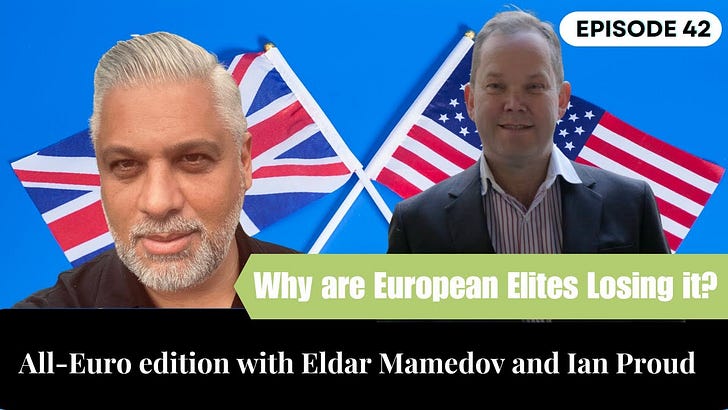To say that the European debate over the war in Ukraine — at least in the elite halls of government, academia and the professional classes — is virtually non-existent, might be an understatement. For all of the grousing my friends in the realism and restraint world have done about the hive-mind thinking about Russia and the war since the 2022, it is nothing like the conformist strictures that exists in the European capitals of Brussels, UK, France, Sweden, Germany and elsewhere in the so-called transatlantic community.
In recent months, as Trump has staked out a new direction for the U.S. policy on the war — toward a negotiated settlement and away from endlessly arming a war of attrition — the Europeans have dug further in.
First, they were gobsmacked when they were not invited to initial talks with Russian leadership in the first days of the administration. Then they were taken aback by the Trump team’s insistence that Europe had to take more responsibility for its defense. Leaders like Emmanuel Macron of France and Keir Starmer of the UK used this as an opening to push for more military assistance and support for Ukraine, even proposing a peacekeeping force of European soldiers, as well as suggesting boots on the ground if the Russians became more aggressive. This, especially, has been dismissed widely as even supporters acknowledge much could not be done without the backing of the U.S. military.
At the root of it all is that the majority of European leadership, particularly in the EU, has not moved very far, if at all, from their initial position that Vladimir Putin and the Russians pose an existential threat to Europe. That is much different from the Trump position that Russia needs to be brought in from isolation in order to end the war and plan for a new security reality in Europe that does not involve NATO closing in on Russia and leaving the region on a perpetual war footing.
Here to talk with me about this and more are two prolific writers on European security, diplomacy, and politics, who have rare, alternative takes on current affairs relating to the Ukraine War, NATO and the elite foreign policy establishment in Europe. Please welcome Ian Proud, who was a member of His Britannic Majesty's Diplomatic Service from 1999 to 2023. He served as the Economic Counsellor at the British Embassy in Moscow from July 2014 to February 2019 and recently published his memoir, "A Misfit in Moscow: How British diplomacy in Russia failed, 2014-2019” and posts at his substack, The Peacemonger.
Also, Eldar Mamedov, he has worked in the Ministry of Foreign Affairs of Latvia and as a diplomat in Latvian embassies in Washington D.C. and Madrid. From 2009 to 2022, Mamedov has served as a political adviser for the social-democrats in the Foreign Affairs Committee of the European Parliament (EP) and was in charge of the EP delegations for inter-parliamentary relations with Iran, Iraq, and the Arabian Peninsula.
More from Ian:
US-Europe divide on SWIFT could derail Ukraine peace talks
Even if the war ended tomorrow, Ukraine could end up broke by 2026
Once never-Trump, Britain's leaders scrambling to stay relevant
More from Eldar:
What happens to EU's anti-war bloc without Marine Le Pen?
Cracks in European ‘unity’ on Ukraine
McCarthyism, European style: The elite crackdown on Ukraine dissent


